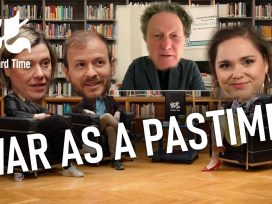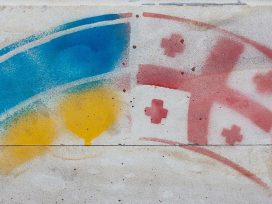A neo-McCarthyism is flooding the Low Countries these days with the Islamophobe law & order PVV party of Wilders being hunted down by almost the whole spectre of “respectable” Dutch news media. Five of the 24 PVV members of parliament appear to have some sort of criminal record, though most of these for minor violations. The hunters of the PVV, chasing what they see as persons and behaviours that threaten their image of what the Netherlands should be, have now become prey themselves. The media that have served Wilders and the PVV and helped them to rise to power, have now turned against them. Party chief Wilders has started to send around one of his famous Twitter comments to newspapers complaining about what he feels is an orchestrated persecution.
It makes me feel queasy. This burrowing of the media into the past of PVV members starts to look like a common or garden witch hunt. So, I for one will no longer be party to this.
When one reads the sensational front page articles and watches prime time television programmes over the last few days, one is meant to conclude that members of parliament should have had no intercourse with real life in their pasts. Parliamentarians should be as innocent as lambs. As in the shivering early years of the Cold War, every member of parliament is checked and each sidestep in the career of any politician is dredged from the deep and smelly wastebins of history. A few days ago, one of the commercial television companies, RTL, formally asked all the parties in the Dutch parliament which of their members in the Second Chamber (Tweede kamer) had a criminal record. Of the 150 members, 149 answered this question. One member refused at first, but later gave in when confronted with some driving-under-the-influence-of-alcohol incident, a decade or so ago. This call to confess by RTL Television News may have its origin in complaints about their alleged bias toward Wilders and the PVV. The outcome has been 7 members of parliament with a formal criminal record of which – as said before – 5 belong to the parliamentary fraction of the PVV.
In the year 2008, the other side of the political spectrum was attacked by the same media who always present themselves as the legitimatized representative of an abstraction called “public opinion” – as the watchdogs that protect the requisite “credibility” of “representatives of the people”. A politician of the Green Left Party, Wijnand Duyvendak, felt compelled to give up his seat in parliament because of his – previously known – involvement in radical direct actions against nuclear energy a few decades back. A carefully-selected tactical moment of media amplification of this dated piece of public knowledge, was sufficient to bring about his fall. All this media hunting is done with the implied intention of supporting “democracy” by cleansing the house of representatives of anybody having whatever “criminal record”. The assumption of these “righteous press campaigns” is that elected representatives should have no criminal or any other kind of controversial past. The house of parliament appears – in this vision – to be some kind of church solely populated by purified and canonized saints.
This premise is more destructive than supportive of a system of elected representatives. Society has more to offer than innocent lambs: and national crime statistics show this clearly. Sanctions (sancties) and sentences (veroordelingen) range into the hundreds of thousands. There is something positive to be said for the experience of “unclean” members of parliament. First of all, the definition of “crime” is always shifting, so that squatting has become a criminal act in the Netherlands only recently, and maybe soon smoking soft drugs will become a punishable offence, whereas hitherto these activities were tolerated. Ex-criminals and ex-offenders in parliament may help to tone down hard-liners with neither social understanding nor human empathy. Deviancy in someone’s career – also in the political party domain – should be verified and accepted. The prevailing witch hunt mentality we see now has the opposite effect. Politicians try to hide their past and tend to pursue even more extreme repressive policy measures (if only to cover up their own past inclinations).
The notion of what is “criminal” has as many shades of colour as a rainbow: from almost legal white collar crime committed by those who mostly manage to stay out of prison, to the “blue collar criminals” that are picked up from the streets and make up the main population of our state prisons. When any citizen who has committed a crime reaches the point of a conviction and subsequent punishment, there is one social rule that applies: for any given case of law-breaking, the matter ha been settled. The “criminal” has become an “ex-criminal” who should be helped to reintegrate into society. Such a basic humane understanding of social relations has disappeared from the media landscape and been replaced with the practice of eager journalists acting like witch-hunters from some twenty-first century Inquisition.
Wilders and his “Party of Freedom” (PVV) – well-known for their scapegoating of Muslims and other “Non-Western-Allochtones” – are now targets themselves. Such sudden changes in the direction in which the cleansing wind of media attention blows, do occur. The “line of legality” is never straight, bending this or another way constantly as power relations in society change. Side-stepping from what is supposed to be “the correct path” may happen to anyone. But there is an established juridical system to judge both the perpetrators and the laws they may have ignored. Additional levels of punishment should be avoided. A democracy cannot allow the “faux pas” of one of its citizens to be met with eternal damnation. Disqualification from active voting and passive voting (being a candidate for parliament) can be imposed by a court decision, but the cases in which this is possible are very much restricted. This is for a good reason. The right to vote and to be elected are constitutional rights. Criminal acts against the head of state or attempts to overthrow a government are specifically mentioned as a basis for exclusion from voting. There are hardly any cases of disqualification from voting or election in the Netherlands over the last decades.
I see such judgmental journalism directed at members of parliament as an orchestrated “mob-justice”, presenting a bigger danger to society than the persons pursued by it. Over the years I have come to the opinion that, “the enemies of my enemies are not necessarily my friends”. I will rejoice in the demise of Wilders and his PVV, but I would prefer that this happens on the basis of a more generalized understanding of the faulty premises in their xenophobic argumentation. The PVV is primed at any moment to take up the cause of the lower middle or middle class underdog. Victimhood always has been an effective political weapon.
The former Prince of the Netherlands, husband of the deceased Queen Juliana, had a long history of trespassing over the lines drawn by the law, from causing car accidents to accepting dirty money for weapon deals and being involved in conspiracies against another state, only to mention a few of his misdeeds. All this was somehow accommodated over decades in such a way that the Prince did not ever have to face a public court. It is a grotesque example of the double standards of law- abiding officialdom in the Netherlands who – on the other hand – have no scruples whatsoever in prosecuting someone with fewer royal credentials.
Structurally speaking, this whole cleansing fury functions as a media smokescreen for the draconian economic measures being pursued by this peculiar minority government coalition of VVD liberals (31 seats) and CDA Christians (21 seats), with the extra-governmental PVV of Wilders conditionally supporting a government which is hostage to his voting machine (24 seats), deemed criminal or not. (In the Dutch House of Representatives, 76 seats creates what is called a “democratic majority”: i.e. half of the 150 seats +1).
However contemptible Wilders and his PVV movement is, their involvement in “white collar” and “fountain pen” crime is – to date – negligeable in comparison with the older, more embedded parties with their long histories in the governance of the country (be they on the right, left or in the middle of the political spectrum). Theft on a gigantic scale – such as the channelling away in the 1990s of 25 thousand million Euro from the reserves of the largest Dutch Pension Fund for civil service workers, ABP, to be disclosed this coming Saturday in a television programme by a former investment director of that fund, Jan Frijns, will most probably not even rank as an “economic crime”. It will almost certainly instead be classified as a “governmental budget policy measure” of that period.
Critical self-reflection on the part of the Dutch media with respect to their role in the recent blamefests is rare, and when it occurs it is only offered as a sideshow, like an editorial comment on the Wilders Witch Hunt by the national News Hour television programme (Nieuwsuur), not broadcast, but hidden away somewhere in writing on their web blog…






